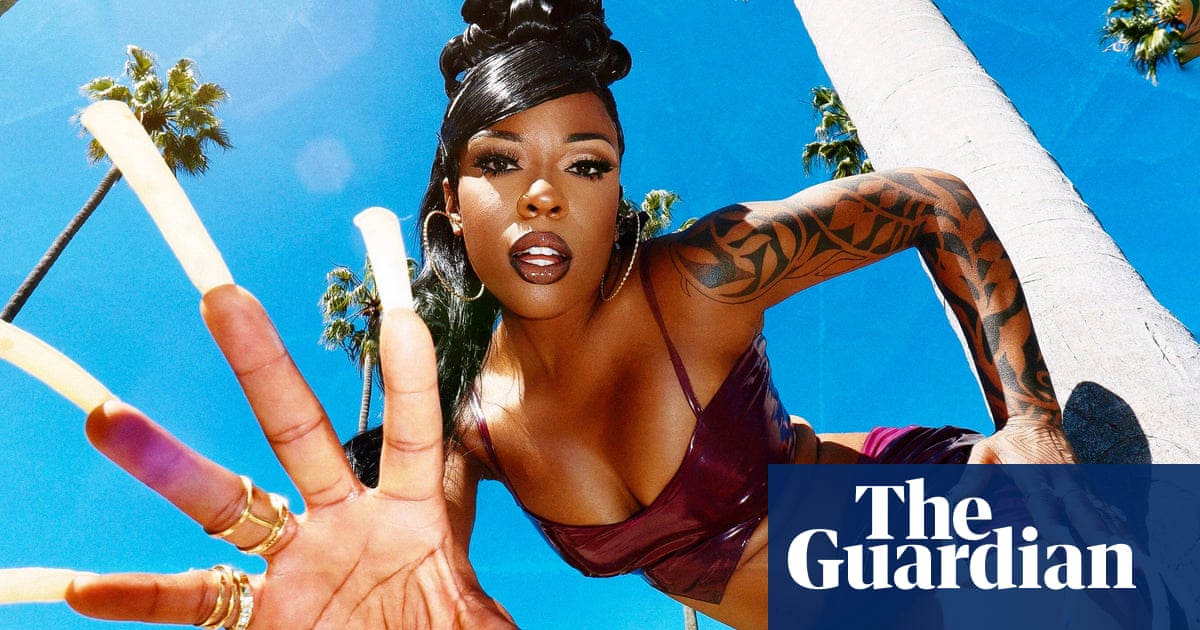
Sudan Archives: ‘In so many places in the world the violin brings the party’
Brittney Parks is on a mission “to show the Blackness of the violin”, she says. As a child in Ohio, she learned to play the instrument by ear. She moved to Los Angeles in her late teens where, escaping her stepfather’s dream that she and her twin sister Cat should form a pop duo, she started to research the history of string music. “I found violinists who looked like me in Africa, playing it so wildly,” says Parks. “It’s such a serious instrument in a western concert setting, but in so many other places in the world it brings the party.”
This discovery pushed Parks towards her true musical path, though it would take a while to get the party started. She named herself Sudan Archives and, after an initial EP in 2017, her elegant, poised debut album, 2019’s Athena, established her exploration of non-western string traditions through the inclusion of instruments such as the bouzouki and oud. But it’s her new album, Natural Brown Prom Queen, that fully embodies the riot of sound that this family of instruments can create.
“It felt like time to let people know who I am,” says Parks, sitting in the leafy gardens of London’s Museum of the Home. “My stage name is kind of academic and on Athena, I created this thoughtful persona centred on pine Black femininity. Now I want to show my looseness, too. I’m a deep, insightful person, but I’m also fucking silly.”
Parks is relaxed in a pair of shredded jeans, sipping a green smoothie through diamante-studded teeth. She shows me clips of her headline show from the previous night in Leeds, the sweaty crowd bouncing to her new music. They reflect the playful energy of the new record, riffing through soul-claps and one-string melodies on NBPQ (Topless) as Parks raps “I just want to have my titties out”; singing over thundering bass about the freedom of cutting her hair on Selfish Soul; or recounting a road romance on the synth-funk of Chevy S10.
Parks was originally going to call the album Homesick “because I started it during the pandemic when I was suddenly really missing Cincinnati and my mom,” she says. “I realised that while I couldn’t get back to Cincinnati, my own place in LA didn’t feel homely either, so I began to nest and decorate.” Parks filled her rooms with plants, rearranged her furniture and – along with her partner, the rapper All City Jimmy – built a studio in her basement where she wrote and recorded the album. “My boyfriend is so LA; he’s lived his whole life here, and his sense of comfort in where he’s from made me realise what I was missing,” she says. “I was always searching in other places for meaning but I felt lost because I never claimed where I was from.”
In her young life, Parks couldn’t wait to get away from Cincinnati. “I felt stifled – it wasn’t good for my creativity,” she says. “All through high school I was a punk. I never stood up for the pledge of allegiance and I didn’t sit with anyone at lunch. I just wanted to get out.”

Things at home were fractious. Her stepfather, who had worked in the music industry with the Atlanta label LaFace, had spotted Parks’s natural aptitude for music and convinced her to form a pop duo, N2, with her twin sister, Cat. But the teenage Parks was more drawn to the DIY party scene than spending time with producers trying to come up with a hit record. At those late-night raves, she was enthralled by the gear and gadgets the electronic acts were using. “Watching those artists, I realised that I didn’t need to be in a band. I could do this by myself,” she says. “My parents told me I couldn’t live with them if I kept going out. So I left.”
Within a year, Parks had moved to LA and was working odd jobs while making beats on her iPad in her spare time. She started frequenting the club night Low End Theory, where the vanguard of the city’s beat-making scene coalesced, and released her first EP as Sudan Archives. Foregrounding the violin, the EP built a delicate soundscape of looped strings, handclaps and body percussion alongside Parks’s layered vocal harmonies. Its unusual blend of acoustic orchestration and fractal beat-making gained Parks a grassroots following. Only a year later, she was playing to a packed crowd at Coachella. “I’m proud that I took the steps to put myself out there and that people responded so well,” she says.
To reclaim her roots on her second album, Parks brought in Cincinnati production royalty Hi-Tek and shouts out her hometown zip code on the track #513. The new music also allows Parks to live out aspects of regular home life that she had missed out on. “I didn’t go to my prom in high school, so the idea behind calling this album Natural Brown Prom Queen is to make it my homecoming,” she says. “I can be my natural self and it feels like I’ve come full circle to embrace my roots.”
It also feels like Parks is finally writing the pop hits she rebelled against as a teen. “It’s getting more experimental than ever,” she counters. “The tracks are more polished and people seem to be responding. I don’t even know what pop is any more – I’m just poppin’!”





































































